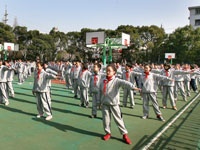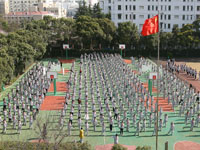预一英语期中复习要点
M1, U1
知识点:
1. 家庭成员称谓: grandfather, grandmother, father,, mother, son, daughter, brother, sister, uncle, aunt, cousin
2. 形容词性,名词性物主代词:
My, your, his, her, their, our, your, its +名词 =
Mine, yours, his, hers, theirs, ours, yours, its
3. 人称代词的主宾格:
I, you, he, she, they, we, you, it
Me, you, him, her, them, us, you, it with 后面加上人称代词的宾格
4. How many + 名词复数
5. get sth. From sb.
He got a watch from his parents.
6. go + Ving ( shopping, swimming, cycling, travelling)
7. play ( football, badminton, basketball, volleyball)
play the piano, the violin
作文:My family
典型题例:
1. How many aunts do you have?
2. I only have one aunt.
3. How many cousins does he have?
4. He has two cousins.
5. What do you do with your aunt?
6. I usually go shopping with her.
7. What else do you do with her?
8. I sometimes play badminton with her.
M1, U2
P.9
1. almost adv. “几乎” 相似于nearly
There is almost no water in the bottle.
Almost no one believes him.
2. not …or… “不。。。以及不。。。”, 否定句中的和用“or”, 不用“and”。
e.g. We can’t run or jump.
The clock has no feet or legs.
3. other
1). adj. “其他的”, 后加所修饰的名词。
three other teachers, the other hand
The other students in my class are from Italy.
2). pron . “其他”
I have two shirts. One is white, the other is red.
4. each other
1) “互相”, 只用作动词或介词的宾语,不可作主语。
help each other, write to each other, learn from each other, know each other
2) each other 用于2者或2者以上, one another 用于3者或3者以上
e.g. I help you. You help me. We help each other.
They three talked with one another.
5. not ……at all 用于否定句, “根本不,一点也不”
She doesn’t like red at all.
---Thank you very much.
---You are welcome. 不客气 / Not at all. 不用谢
It’s a pleasure. 我很乐意 / That’s all right. 没关系
My pleasure
--- I’m sorry.
--- That’s all right. 没关系 / It doesn’t matter. 没关系
Never mind. 别介意
6. sometimes “有时侯”, 一般在be动词之后, 或行为动词之前; 也可放于句首。
He sometimes shows me his photos.
Sometimes I go to work by bus.
I am sometimes late for class.
7. never “从不” , 一般在be动词之后, 或行为动词之前;反义词always.
He never goes to the cinema.
I am never late for school.
8. watch “观看 ’, 指看那些运动的画面或场景
watch TV, watch a football match
去看电影: go to the cinema, go to see a film, go to the movie
9. like to do sth..
They like to play outside.
like to be together
10. walk to school == go to school on foot
11. be late for “ 。。。迟到”,
e.g. Jim is late for school.
Don’t be late for work again.
12. share: share sth. with sb. 和某人分享某物
e.g.. She shares the room with her sister.
P10.
1. friendly adj. “友好的”。 E.g. lovely, lively, n.是 friendship 友谊
1) She gives me a friendly smile.
2) 对某人友好 be friendly to sb.
Our English teacher is friendly to us.
= Our English teacher is kind to us.
2. helpful adj. “有帮助的”, 反义词helpless, v. help 帮助, n. help帮助; helper 助手
1)You should be a helpful person.
2) 对某人有帮助的 be helpful to sb.
Our teacher is helpful to us.
3. kind
1)adj. “和蔼的”
Would you be kind to the earth?
She is always kind to others.
2) n. “种类”
I like all kinds of food.
4. others pron. “其他人, 其他物”, 为复数
e.g. Some students are reading, others are writing. Others = other students
Some students in Class Two are reading, the others are writing.
5. naughty adj. a naughty child, He is very naughty.
6. lie n. “谎言”, 有单复数。
tell (me) a lie / tell (me) lies
7.work hard 努力工作,勤奋学习
e.g. She works hard. = She is hardworking.
8.get angry 生气, 光火
对某事生气: get/be angry at/ about sth.
对某人生气: get/be angry with sb.
P11.
1. Ocean “洋, 海洋”, sea “大海”, 位于洋与陆地接壤的边缘。
e.g. Which is the largest ocean?
It’s the Pacific Ocean.
The Atlantic Ocean the Indian Ocean The Arctic Ocean
2. yet adv. “还, 仍然”, 用于现在完成时的否定句和疑问句中, 放于句末;在肯定句中用already. “已经”, 放在have/has之后
e.g. ---Have you written to your mum?
---Not yet.
Have you read the newspaper yet?
No, I haven’ finished my homework yet.
He has not come yet.
He has already gone to work..
I have already heard the good news.
------ I haven’t heard the good news yet. (否定句)
------ Have you heard the good news yet? (疑问句)
区别Still ,Still用于肯定句中。
I’m still doing my homework.
3. Just adv. “刚刚”放在have/has之后
e.g. I have just been to Hangzhou.
4. for the first time “第一次”
e.g. I’m cooking for the first time.
She went to America for the first time.
4. visit sb./ a place
e.g. We are going to visit (the Shanghai Zoo).
--Where are you going to visit?
We have already visited Miss Li.
5. have/has been to “去过某地”, 说话时人已经回来了。
e.g. ---Have you been to Japan?
---No, I haven’t been there.
have/has gone to “已经去某地”,说话时人还没回来。
e.g. She has gone to Japan.
当他们后接here, there, home时,由于他们本身是副词, 所以中间不加to.
e.g. have been there (已经在那儿)
have been here (已经在这儿)
have gone there (已经去那儿)
have gone home (已经回家)
6. What about ……? = how about…? “。。。怎么样?”
What about sth./ doing sth.?
e.g. What about drinking a cup of coffee?
What about going to Century Park?
What about your opinion?
What about a trip to Japan?
7. ….ask Winnie about …..? ask sb. about sth.
e.g. He never asks me about my secret.
P.12
1.look after = take care of “照顾”
e.g. can you look after my dog today?
2. environment “环境”
e.g. A noisy room is not the best environment for a sick man.
3. pollute v. “污染”
e.g. People pollute the environment.
pollution n. “污染”, 不可数
e.g. The water pollution is bad for our health.
air pollution land pollution
noise pollution ocean pollution
soil pollution water pollution
4. land
1)不可数名词, “陆地, 土地”
The green parts are land, and the blue parts are water.
2) v. “登陆, 着陆”
The plane landed here at 7.
5. keep “保持”
e.g. keep quiet.
keep sb. doing sth. “使某人一直作某事”
e.g. I’m sorry to keep you waiting.
Keep up with sb. “跟上, 赶上”
e.g. You should work hard to keep up with your classmates.
6. pick up sth. = pick sth. up 把。。。捡起来
Mary, pick up the rubbish.= Mary, pick the rubbish up.
pick it/them up pick up it/them
pick 摘
e.g. Don’t pick the flowers.
7.leave 留下
e.g. It’s time for us to leave.
Kitty left her umbrella in the classroom.
作文: My good friend
The environment
M1, U3
P.16
知识点:1. spend 度过 spend a holiday in Beijing
spend a day out together 一起出游一天
花费 1). xx spend time/ money (in) doing sth.
典型题例: e.g. He spends a lot of money in making models.
2). xx spend time or money on sth.
e.g. Mary spends much time on books, so she studies well.
知识点:2. weekend (Saturday and Sunday)
e.g.--- Have a good weekend.
---The same to you.
at the weekend 在周末
at weekends 在每个周末
on weekdays 在工作日(from Monday to Friday)
典型题例:3.---What do you usually do at weekends?
---I usually do my homework.
---What does Mary do?
---She does her homework..
---What did Mary do last night?
---She cleaned her bedroom.
4. Is Sandy Bay near or far away from Spring Bay?
此为选择疑问句,结构为:
一般疑问句+ or + 选择词?
它不用yes / no回答,而按事实回答。回答时根据实际情况,但要注意答句与问句时态一致
---Are you Japanese or Chinese?
---I’m Chinese.
near 反义词为 far away from
P. 17
知识点:1. seaside
at the seaside在海滨
a seaside city一个海滨城市
----seashore, seahorse, seafood….
2. lucky adj. 幸运的
e.g. I am lucky that I can meet you here.
my lucky number
lucky money 压岁钱
unlucky adj 不幸运的
luck n. 幸运, 运气 Wish you luck.. bring you luck
luckily adv. 幸运地 Luckily, I got to the museum on time.
3. museum
the History Museum the Shanghai Museum
4. a photo of my mother and me “一张我同我妈妈的合影”,强调照片里有“我”。
A photo of mine “我的一张照片”,强调我有的照片, 但照片里不一定有“我”。
5. 现在进行时: be + Ving
We are shopping together. Shop, v. “购物”
We are eating ice cream together.
P. 18
1. activity (pl.) activities, active adj. “积极的, 主动的”
e.g. Her activities are painting and dancing.
We are taking part in school activities.
outdoor activities
sports activities
classroom activities
2. sandcastle make sandcastles
3. collect
collect shells collect stamps
collection n. a collection of her photos
P. 19
1. plan v. plans planning planned
plan a visit
plan to spend a holiday in America
plan to do sth. = be going to do sth.
n.
make a plan
2. shall modal v. “将要”,后加动词原形, 表示将来时,只适合“I,we”的主语。比较客气, 其他用法与will相同。
e.g. I shall write to you again.
Shall I do the washing-up?
Shall we go to the cinema this weekend?
3. o’clock adv. 5 clock
clock n. look at the clock
4. cost v. 花费
Sth. cost/costs/cost (sb). ….money.
e.g. The dress costs me $ 30.
How much does it cost? = How much is it?
How much do they cost? = How much are they?
n. 费用,花费
e.g. The cost of the bag is 450 yuan.
5. trip n. during a trip to Nan Jing 在去南京的旅途期间
make a trip (to) 去。。。的一次旅行
go on a trip (to) 去。。。的一次旅行
6.Which place shall we visit?
7. When shall we go there?
When “什么时候”, 用来询问不具体的时间。
We lived in Shanghai (4 years ago).
---When did you live in Shanghai?
8.What time on Saturday? 星期六的什么时间
What time “几点”用来询问具体的时间,几点钟。
9. 现在完成时:
现在完成时指过去持续到现在的动作或状态,常于already,just, yet 等副词连用。
结构是: have/ has + p.p
e.g. We have already played the violin.
I have just finished homework.
I haven’t finished homework. yet.
Have you finished homework yet?
Yes, I have.
No, I haven’t.
10. how about = what about “怎么样”,用于询问消息或征求别人的建议等。
how about sth./ doing sth.?
e.g. How about the red coat?
How about going fishing?
11. how much
1). 指“多少钱”,用来询问价格。
---How much is the fruit? = How much does the fruit cost?
---It is 5 yuan. = It costs 5 yuan.
2)指“多少”,用来提问不可数名词的数量。
---How much milk is there in the fridge?
---A little.
12. How are we going to get there? 我们将怎样到达那里?
1) How用于询问交通工具
它的回答用: On foot. / By bus.等
2) get there “到达那里”, ** home, here, there 等地点副词前不加to
arrive home “到家”
come here “来到这儿”
get to school = arrive at school “到校”
13. 一般将来时
常与:
1)以this 引导的短语: this evening “今晚”, this afternoon“今天下午”,
this week “这一周”, this year “今年”, this month“这个月”
2)以 next 引导的短语: next week “下周”, next year “明年”,
next month “下个月”
3)还有: tomorrow“明天”, tomorrow morning “明天早上”,
the day after tomorrow “后天”, in the future“在将来”
构成:
1) be going to + 动词原形, 指“打算要做的事情,或自然现象要发生的事情”。
e.g. I’m not going to see him tomorrow.
It’s going to rain at once.
2) Will / shall + 动词原形, 指“将要发生的事情”
e.g. I will meet you at the gate.
14. Let’s go by bus.
Let’s + 动词原形, 指提建议的祈使句。
e.g. Let’s buy some sweets.
Let’s take a bus to go there.
M1 U4
1、 知识点:
1)名词单复数的转变:fireman firemen (pl.)
firewoman firewomen
postman postmen (pl.)
policeman policemen
policewoman policewomen
2)动词与名词的转变:work worker
teach teacher
drive driver
work worker
dance dancer
wait waiter
waitress
act actor
actress
3)would like sth. = want sth.=‘d like sth.
4)would like to do = want to do
5) look for 寻找(强调过程)
find 找到(强调结果)
find out 查明,弄明白(常指要经过一番调查研究才能查出)
e.g1 I look for my book everywhere. Then I find it on his desk.
e.g2 Please find out when they leave school.
6) job 可数名词 a job, two jobs
work 不可数名词
job “工作”, 强调的是职业,为可数名词
work “工作”, 强调的是所做的事情,为不可数名词
My father has a job as a fireman.
Teachers begin their work early.
7) teach:
teach sb. + sth. teach us English
teach—teaches—teaching--taught
8)作询问别人是做什么工作的, 用:
? What job do you do?
? What’s your job?
? What are you?
? What job does Mr Li do?
? What’s Mr Li’s job?
? What is Mr. Li?
9)作文:My ideal job
2、典型题例:
I would like a cup of tea.
I want a cup of tea.
I would like to have some meat for dinner.
---What would you like to have for dinner?
I want to have some meat for dinner.
---What do you want to have for dinner?
e.g2 Would you like to go to the cinema with me tonight?
=Do you want to go to the cinema with me tonight?
e.g3 I would like to play football after school.
---What would you like to do after school?
I want to play football after school.
---What do you want to do after school?
M1U5
知识点:
1. 一般将来时: will + V
2. 一般过去时: V 过去式
3. at + 具体的时间点
at two o’clock at two fifteen at two thirty
4. on the ground / first / second / third / fourth floor
5. want sb. To do sth. invite sb. to do sth.
invite invitation
6. First, Next, Then After that, Finally,
7. 到达 arrive at + 小地方 arrive in + 大地方
get to / reach
典型题例:
1. Your parents will arrive at two o’clock.
2. They will listen to the school choir in the hall at three ten.
3. She’ll be in the Arts and Crafts room, on the second floor.
4. They visited our classroom at two fifteen.



















